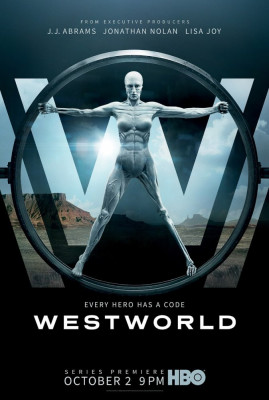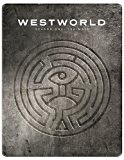| Reviews & Columns |
|
Reviews DVD TV on DVD Blu-ray 4K UHD International DVDs In Theaters Reviews by Studio Video Games Features Collector Series DVDs Easter Egg Database Interviews DVD Talk Radio Feature Articles Columns Anime Talk DVD Savant Horror DVDs The M.O.D. Squad Art House HD Talk Silent DVD
|
DVD Talk Forum |
|
|
| Resources |
|
DVD Price Search Customer Service #'s RCE Info Links |
|
Columns
|
|
|
Westworld: The Complete First Season
Westworld also recalls series like Damages (2007-2012) insofar as the series partly is structured like a puzzle. Scenes are repeated, added to or altered or shown from different vantage points, the larger story and themes peeled away like an onion.
The original movie had been one of the last produced by the original MGM, on a paltry (even then) budget of just $1.25 million. The series, even with all the deliberately repetitious (and thus cost-saving) action, is budgeted at $8-10 million per episode, with $25 million spent on just the pilot.
Both the movies and the TV show concern a Wild West-themed futuristic theme park, Westworld, populated by highly advanced androids, here called "hosts." At $40,000/day (up from $1,000/day in the 1973 film), the park attracts only the richest of the rich, the one-percenters, who indulge in sex at the local brothel and violent gunplay with machines that bleed realistically but programmed not to harm them back.
The original film was told primarily from the perspective of a guest (Richard Benjamin), visiting the park for the first time with a more experienced friend (James Brolin), who'd visited before. There were behind-the-scenes vignettes with the park's staff and the script followed a few other guests, but the movie was mostly about Benjamin's character, and how a computer virus (the movie was perhaps the first to use the term) causes the lifelike robots to malfunction. They begin murdering guests, forcing him to face an unstoppable gunslinger robot, played by Yul Brynner. Brynner, trading off his Magnificent Seven look, was an intimidating presence, but the robots in the movie Westworld were only just that: malfunctioning machines.
The TV series goes in a different direction. Where the movie was 85% about the guests, primarily Benjamin's character, and 15% about the technicians working behind the scenes, the TV show is roughly 40% about the androids, 40% about the workers within the park, and only 20% about the guests. In particular, the show is mainly about the ramifications of sentient artificial intelligence, and the ethical and moral problems of creating and using such technology like cattle to be slaughtered as livestock, to be raped or murdered by guests on a regular basis.
The movie Westworld took a concept decades away (at least) from reality and cleverly encouraged a reasonable suspension of disbelief. One of the strange qualities of the new TV series is that the artificial intelligence aspects of seem utterly plausible and reachable within a few years, while the physical logistics, rather than the computer science, still seems way out of reach. It now seems possible to program almost anything, but getting an android to walk across the room with lifelike gait is harder to accept.
Another big difference between the movie and the TV show is that the movie presented Westworld as an Old West imagined in movies, so much so that it's a shame it didn't populate more with actors other than Brynner so associated with the genre at that time. The TV show presents a more historically authentic West closer to the look of things like Lonesome Dove, though with modern flourishes to amp up the violence and make the villain "hosts" more frightening.
Because so much of the enjoyment of Westworld is unlocking its mysteries, this review won't discuss too much beyond its pilot episode. That first show is a bit of a cheat, with a guest, Teddy Flood (James Marsden) arriving in Westworld and falling for host Dolores Abernathy (Evan Rachel Wood), a wholesome farmer's daughter. She's threatened by the Man in Black (Ed Harris), Westworld's nod to the original film's Yul Brynner character. Only when Teddy fires his pistol at the Man in Black it has no effect: Teddy's a robot, and the Man in Black is guest, albeit a profoundly sadistic one.
Later, Richard Benjamin/James Brolin types turn up in the form of William (Jimmi Simpson), a first-time visitor to Westworld; and Logan (Ben Barnes), his future brother-in-law and a jaded in the most annoying Millennial sense. William is himself attracted to Dorothy who, despite her youthful appearance, is the oldest operating android in the park.
Attracted to Dorothy for different reasons is Bernard Lowe (Jeffrey Wright), the head of Westworld's Programming Division. When the androids begin acting strangely, he has Dorothy brought to the park's vast underground operations center, interviewing her about her emerging sense of self-awareness, which he finds both fascinating and disturbing, given how the park's guests and employees treat the hosts. Other important characters include Robert Ford (Anthony Hopkins), the park's mysterious, emotionally detached co-founder; and Theresa Cullen (Sidse Babett Knudsen), Westworld's operations leader and Bernard's lover.
Created by Jonathan Nolan and Lisa Joy (and boasting what seem like dozens upon dozens of executive and associate producers), who write or co-write with others most of the first season's ten episodes, Westworld is impressively intelligent, and may even be the most existential mainstream television series ever. Though like even the best TV series these days it has a tendency to mercilessly tease the viewer, the modern equivalent of the old movie serials, most of its episodes are densely thoughtful, full of implications that linger with the viewer long after each episode is over. It's disturbing in ways the original movies never quite were, yet there are also neat little references to fans of those pictures. In the pilot, I was started to see the park's long-abandoned subterranean lobby appeared to be a nearly exact reproduction of the set used prominently in Futureworld, a reference that must have taken considerable effort to achieve yet few would notice. The series is also to be commended for its restrained use of CGI and showy special effects generally.
Video & Audio
Warner Home Video's Westworld: Season One looks and sound great. Wisely originating on 35mm film, the program is presented in 1.78:1 widescreen in 1080p, with 5.1 DTS-HD Master Audio, with Dolby Digital French, Spanish, and Portuguese tracks, as well as subtitle options in all those languages plus Spanish, Danish, Dutch, Finnish, Norwegian, and Swedish. The packaging is ungainly, with a lot of effort put into the design without much thought to the practicality of getting the discs in and out of the box. It is, however, sturdy and includes an insert with an episode guide, cast list, and tells the buyer where all the special features are to be found.
Extra Features
Supplements include the usual sorts of things one expects to find on a big release such as this. Featurettes include "About the Series," "An Invitation to the Set," "The Big Moment: Teddy vs. The Man in Black," "The Big Moment: A Host Self-Sabotages," "Welcome to Westworld," "Realizing the Dream: First Week on the Set of Westworld," "Imagining the Main Title," "Reality of A.I.: Westworld," "The Big Moment: Maeve Gets an Answer," "The Big Moment: Bernard Faces an Unlikely Saboteur," "The Big Moment: Dr. Ford's Blood Sacrifice," "The Big Moment: The Truth About Bernard," "The Big Moment: Dr. Ford's New Narrative." "The Key to the Chords," "Crafting the Narrative," and a gag reel.
Also included: an amusing insert booklet, designed as a "Corporate Guidebook: Handbook for New Employees."
Parting Thoughts
Full of promise, Westworld is one of the best programs on American television at the moment, and a DVD Talk Collector Series Title.
Stuart Galbraith IV is the Kyoto-based film historian largely absent from reviewing these days while he restores a 200-year-old Japanese farmhouse.
|
| Popular Reviews |
| Sponsored Links |
|
|
| Sponsored Links |
|
|
| Release List | Reviews | Shop | Newsletter | Forum | DVD Giveaways | Blu-Ray | Advertise |
|
Copyright 2024 DVDTalk.com All Rights Reserved. Legal Info, Privacy Policy, Terms of Use,
Manage Preferences,
Your Privacy Choices | |||||||














